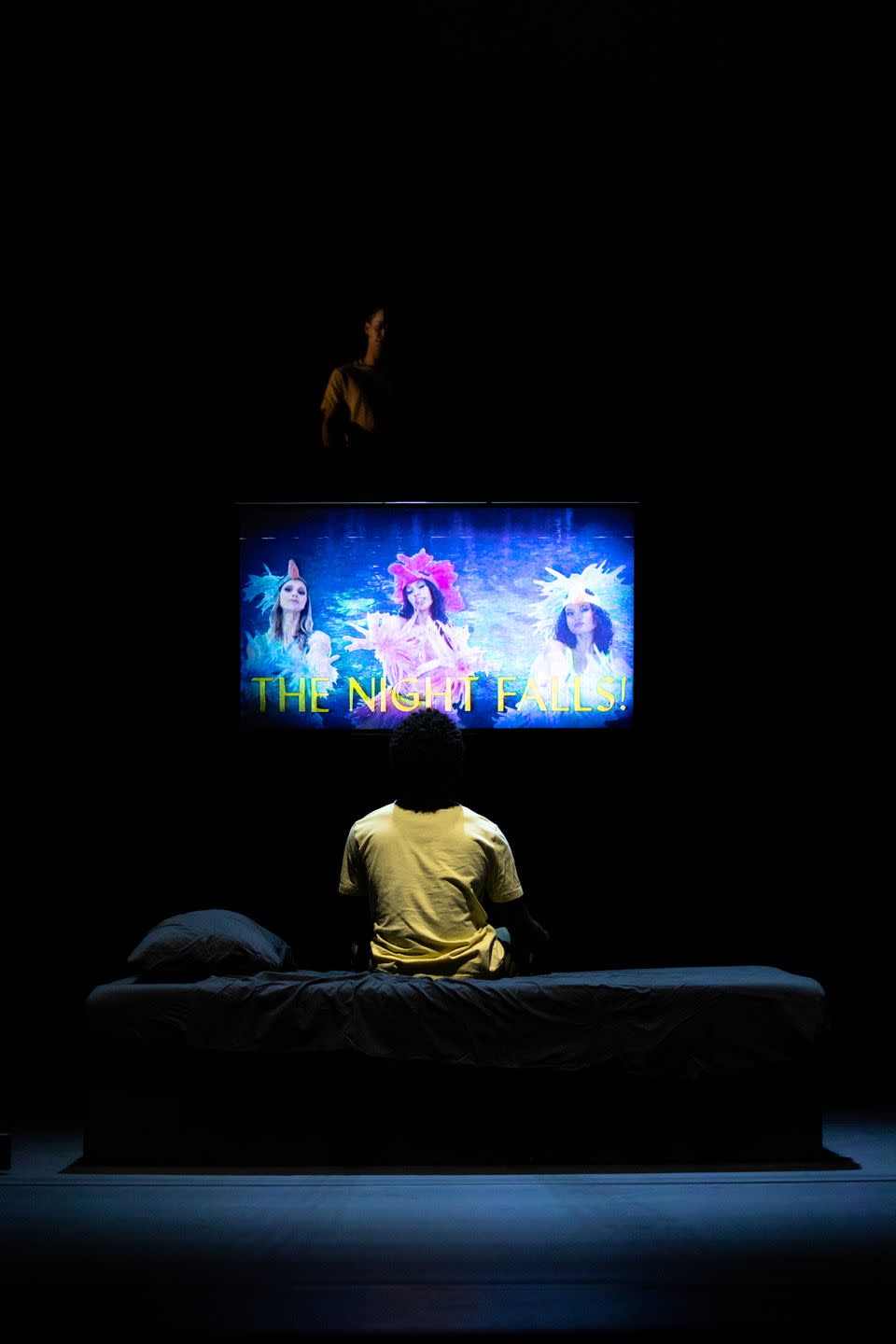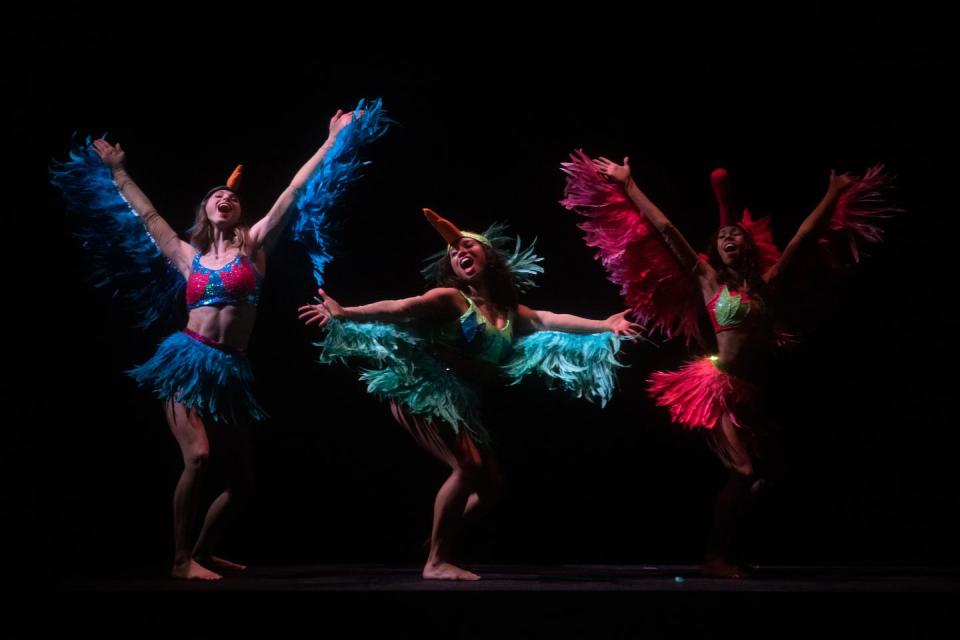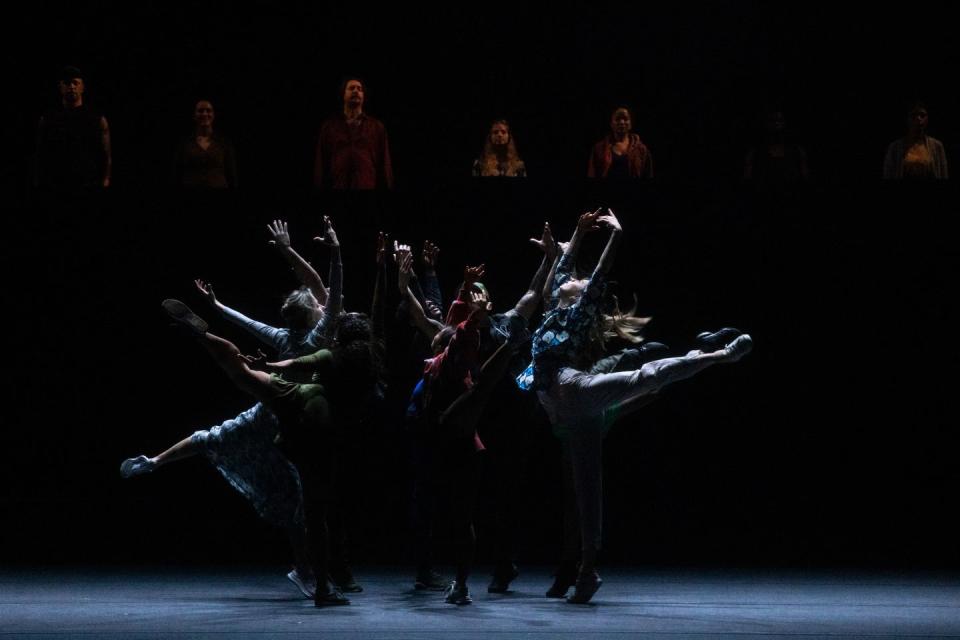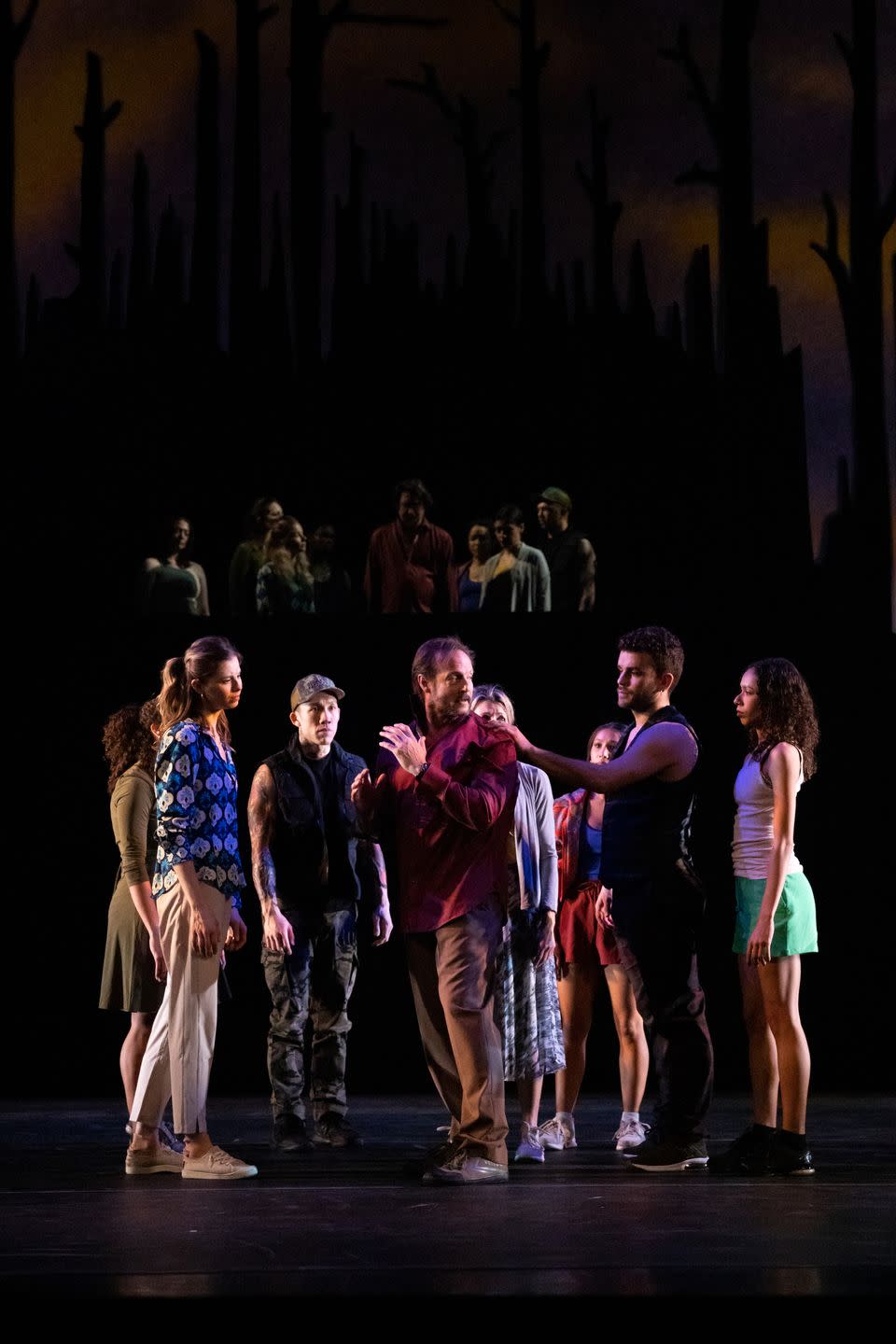Karen Russell Is Resisting Despair

Picture this: at The Night Falls, a roadside tourist attraction built around a mysterious grotto in the Florida wilderness, a trio of Sirens lure tourists to the water’s edge with their “dangerously beautiful music.” All across America, their song spreads through dreams and nightmares like a “sonic contagion,” drawing sufferers from all walks of life to the grotto, “home of the world’s eeriest echoes.” Here, in this strange and sublime place, these lonesome strangers find a nourishing community in one another—an antidote to the Sirens’ seductive song of despair.
Such a fiction could only come from the visionary imagination of Karen Russell—but for the first time ever, Russell has partners in dreaming. The always-imaginative novelist has teamed up with composer Ellis Ludwig-Leone and director-choreographer Troy Schumacher to create The Night Falls, a dance-driven show transposing the Greek myth of the Sirens onto a Floridian tourist trap. In The Odyssey, Odysseus lashes himself to the mast of his ship to resist the Sirens’ call, but in The Night Falls, these sufferers lash themselves to one another, sharing their stories through song and forming human geometries through dance. “This is a group of people from all walks of life who arrive as strangers, thinking they have only a nightmare in common, who discover they can merge into one another's stories and mix their own medicine,” Russell tells Esquire.
Russell, Ludwig-Leone, and Schumacher first dreamed up the scenario in 2018, but in the years of cascading catastrophes since, the Siren song has become known to nearly all of us. The Night Falls dramatizes how despair cleaves the soul through a clever staging metaphor: each sufferer is split in two, played by a dancer on the stage and voiced by a singer up above. As a mental health crisis reaches fever pitch, the show makes a poignant statement about how we live with depression, and how we brace each other through it. “The siren song is an earnest invitation to just disappear, which to me is terrifying and sometimes seductive,” Russell tells Esquire. “There's a real tension between wanting to be someone and the struggle of wanting to be nothing and nowhere. This is a very old story, and I think it's known to a lot of people.”
The Night Falls is a production of BalletCollective and PEAK Performances, running at Montclair State University’s Alexander Kasser Theater February 9-12. Behind the scenes of an early sneak peek at the Guggenheim Museum, Russell sat down with Esquire to take us inside her latest fictive dream, and how it changed her forever.
ESQUIRE: Where did your journey with The Night Falls begin?
KAREN RUSSELL: As some people know, I'm obsessed with the dissonance between manmade theme parks and the genuinely sublime ecosystems of Florida. When these guys approached me, they invited me to write a scenario. I have 40,000 ideas for stories, so it seemed like a dream assignment. Then it just didn't work out that way, and thank God, because Troy, Ellis, and I have been really involved in every piece of this project. I was never a theater nerd, so this has been a joy. It was amazing to be part of these other mediums, and to see the things they can express that language on paper can't do.
Was that freeing? Writing fiction is dreaming alone, but it sounds like you got to dream together.
We got to dream together from the very beginning. For a long time, the three of us were the only people who had this world on our GPS. When you’re wordlessly arrowing toward the same target together, that’s just a joy and a delight. We all understood what this could be, and we held the line for each other. Ellis would say, "I don't know about this song,” and Troy and I would say, "It's a great song." I would have ideas that I was really committed to, but I believed them when they said, "That's not a great idea." It was a beautiful experience to feel like we were all really pushing to reach our shared vision and less invested in being right. It was exactly what the show is, I think. When you make a world together, you have a real protection against that seduction of despair. During the pandemic, it was beautiful to be working on something about people struggling to make meaning of their lives and to mean something to one another. That's exactly what happened for us. I didn't know these gentlemen at all, and now they're two of my best friends.

The show has an obvious mythological tie-in with the Sirens, but I was also interested to see references to Demeter, Orpheus, and other mythological figures in The Night Falls. What's your relationship to mythology?
I love myths, and I thought of this as something like a new myth. When I started this project, I didn't know that there were other versions of the Siren myths. In some versions, when Persephone was captured and taken to the underworld, the gods gave her friends wings and sent them out to search for her. When they gave up, they sank to the rocks and became these cannibalistic monsters. That resonated with me. I've certainly been there myself. It's a real failure of the imagination—you cannot imagine success of any kind. Even this moment we’re living through, where we're processing the bill coming due for us on this planet, there’s real grief and despair. You only have to touch it lightly to cue up that music in people. We're all suspended in that state of ongoing crisis and emergency, which was something we wanted to address in this story. We wanted to touch it lightly, because everyone knows it. We're all sharing that horror and sorrow.
Your Sirens aren't like any Sirens I've ever seen before. How did you want to characterize them differently?
When I thought about these women who became monsters because they gave up on the search for spring, I realized, “These women are the victims of the siren song.” The song seduces you, saying, "Just give up. Just surrender now." I don't know anyone alive who doesn't feel that undertow.
But we didn’t want it to be so self-serious. It’s the transposition of a Greek myth, but it felt funny to start it as a television commercial. At first, the sirens are just ladies trying to lure RVs off the highway to their theme park. Think of them like the Weeki Wachee mermaids—there’s something so Lynchian and uncanny to me about those mermaids. I loved the idea of toggling between something kitschy and a genuine call to despair. We have a young teenager hearing these women singing to him night after night on television—a strange, traumatic looping. He sees this Lynchian commercial for them, which is hilarious and scary. In the end, it’s an earnest invitation to just disappear, which to me is terrifying and sometimes seductive. There's a real tension between wanting to be someone and the struggle of wanting to be nothing and nowhere. This is a very old story, and I think it's known to a lot of people.
It was fun to map some of these contemporary characters onto more archetypal figures. We have a Demeter-like mother who fails to save her daughter from an overdose. We have an Orpheus-like composer who misses a lot of his life because he's lost in ambition. People are split in two by this song to show that fracture. Dancers exist on the stage, then up above, we have someone singing for them. It’s the vital part of yourself that you lose access to in this state. When that song of despair is so loud, you can't hear the voice telling you what's possible, how to live, or how to imagine any other kind of music. The staging is a big metaphor, but still, we wanted to have fun. It's fun to imagine the Sirens in their new money lair in Florida.

The Night Falls arrives amid a wave of mythological retellings. Do you see it as entering a new canon?
It’s a tricky show to describe. It’s a mythological retelling, but the language of the telling is dance. It’s about how these haunted people, thinking they're entirely alone with this private song, recognize one another. They're able to build into a human geometry; we hear it in the music and see it in the choreography. When we think of the word “retelling,” we automatically think that’s happening in language. But this is a different experience, happening in the body. It's like how in a book, author and character and reader merge. That's so uncanny, so spooky, so beautiful. It's also so active. What we’ve done here is dramatize that leap of empathy, which is so cliché, but such a miracle. This is how you bridge out of your privacy. That felt central to me—to really feel in your own body, "We’re all experiencing this shared reality that the story opened up." It’s beautiful to see it done in this kinetic language.
It’s a pretty earnest story, but an old one. I think that's the mythic piece. Everyone knows the original myth, when Odysseus says, "Plug up my ears and tie me to the mast." He goes it alone, but these broken people have each other. They're going to have to keep finding their equilibrium, because that song doesn't stop pulling at you, but they have each other.
Did making the story less about the hero’s single-handed journey feel more modern to you?
It feels deeply important to me that this is not "the hero's journey." This is a group of people from all walks of life who arrive as strangers, thinking they have only a nightmare in common, who discover they can merge into one another's stories and mix their own medicine, "remembering" in such an active way, teaching each other a new way to move through their lives, a unity that does not erase or deny difference. That's what feels so human and incredible about Troy's choreography and casting to me—the way he has dancers from very different backgrounds and lets them find their own way into and through the choreography. It always feels like it's emanating from their character; it's so grounded and human. Similarly, Ellis cast opera singers, Broadway singers, and indie singers. I think that vocal range suggests a new kind of diversity in theater, and to hear them all singing together, singing over the Sirens' icy invitation, feels so powerful to me.
Watching the Sirens move from the grotto through the crowd and emerge transformed from monsters into spirits that sing to the dawn, disappearing as three birds over the treeline, hearing these prime integer words riding up on Ellis' surging score... I'm clearly biased, but I think it's so beautiful, and the happiest final scene of anything I've ever personally written. Even as the music and choreography and even the lighting makes it clear that it's not a stable resting place, but a beginning. They become the ship, navigating an unknown future.

I was so moved by that redemptive arc for the Sirens.
They’re not bad at all. When despair spools up all your energy and imagination, it's just not available to you. The only thing that seems like a solution and a relief is nothingness. It’s a real tragedy when that happens. But we've talked before about hope as a continuous negotiation with the future.
Can you unpack what that means to you?
It was important to all of us that the show doesn’t end on the note of, "Roll credits. We did it." It's not that simple. We all have to live with the foreknowledge that we're going to lose everything. That's the single guarantee in life. It’s quite a burden to carry, and it’s better to carry it together.
I think hope is very active. It's not just some sentimental feeling—it’s a continuous negotiation with an unknown future. I’ve always loved speculative fiction because it shows us that there are alternative ways of doing things and alternative ways of living. You have to imagine a way forward before you can get there. It’s so easy for my imagination to list in dystopian directions, but it feels very active to pivot and ask, "What could happen? What is unwritten? Where do I have agency?"
What would hopeful speculative fiction look like?
I’m working on a novel set during the Dust Bowl drought about a photographer who has a time-traveling camera. She's sent to make pictures of a shooting script. That's a pretty narrow story and a pretty dark one, but the camera's gone rogue. It starts out making propaganda. It's documentary photography, but it was also meant as propaganda for the New Deal. In my future work, I’d like to write about the functioning, caring, and caretaking society that I want for my children, to make that more vivid and plausible.
It's interesting how speculative fiction has become a synonym for dystopian fiction. Now that you mention it, I realize, "It doesn't have to be that way at all."
It doesn't have to be, at all. I’ve done what I wanted to do with dystopian fiction. Now I’m having conversations with experts where I ask, "What if you were to scale this work you're doing with conservation—what would it look like?” Kim Stanley Robinson is doing this—he’s given us a road map to imagine other ways. I’ve been thinking about the kinds of social change that would make this world better and also help prevent the dire ecological consequences scientists are predicting for us. In my mind, it's not some Jetsonian technology. It's also about asking: how do people live together? What communal technologies do we have for living together?

Do you see it as the responsibility of this hopeful speculative fiction to come up with those technologies, or is that the job of the scientists?
I myself cannot. I’m sure Ted Chiang can. Let's hope that's his beat. But I can do the hope. I think there are different orientations toward nature and toward each other. That can be my beat.
I like that attitude. Use fiction to dream up the world we want to live in.
I do exactly that. I’ll ask myself, "God, what if I turn my imagination this way and make propaganda for the future as this time-traveling photographer?" It can be hard to sustain; we get distracted by boring questions. I just read Sea of Tranquility, and I thought Emily St. John Mandel had such a light touch with this. Do you need to know all about the agricultural robots? No, you don’t. They're there in the distance, and that’s enough.
Looking back on our interview from 2020, I sense that these themes have ben percolating with you for awhile now. Back then, you said, “Despair can become its own seduction, and we can't afford the kind of fatalistic outlook that leads to inaction on these existential threats to our democracy and planet.” How are you resisting to despair and finding hope these days?
Truly, being part of The Night Falls has given me hope. I felt so hopeful seeing all these brilliant artists contribute to make this world. I really cannot overstate how much work everyone has put in. To see people's very diverse gifts and talents merging in the microcosm of this world we're trying to build… that gives me a feeling of possibility.
For this novel I'm working on, I've been trying to have conversations with people who are pointing us toward other ways to live. I met Mimi Castellano, a soil scientist and a forest ecologist. She told me about these ranchers in Eastern Oregon who have done things the same way forever. Now the bill is coming due, and they're saying, "This is not functioning. We need to change something." They’re running a trial on an acre of ground to see what happens if they don't export all their crops to feed enclosed hogs in China; instead, they’re keeping the products and the photosynthesis in the ground. The land roars back so fast.
People keep asking: where’s the carbon vacuum? Where’s fusion? Those technologiges would be great, but also: where’s the change in our values? Instead of just aiming at these technological solutions, could we think differently about what we owe? Could we feel gratitude? I talked to Electa Hare-RedCorn of the Pawnee Nation. She does all kinds of amazing seed preservation work. What would it mean to think in circles and cycles instead of lines that end? Electa said, "Once you're a steward of that kind of abundance, you move away from a fear-based, greedy, acquisitive, terrified way of thinking." That mindset is incentivized by our economy. That can be contagious, but we’re such mimetic creatures. Things can blossom, right? Things can bootstrap. A spark can catch and spread.
You Might Also Like


